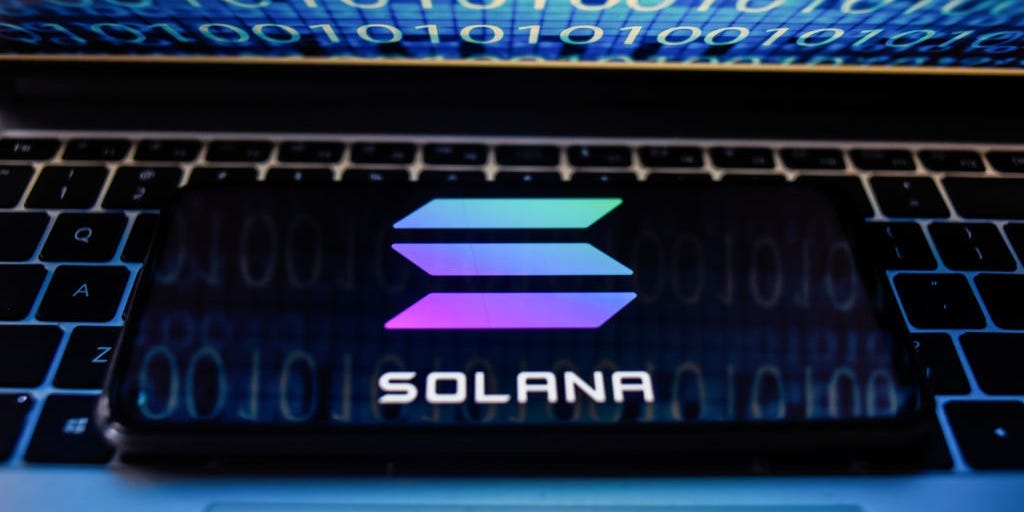- LinksDAO is a collective of golf enthusiasts that have teamed up to buy a golf club.
- Crypto VC Mike Dudas helped launch the idea, which raised $10.4 million in under 48 hours.
- On a podcast, he explains how the DAO works, his VC investing strategy and top crypto projects to watch.
Golf, the sport of calculation and patience, just collided with the loud and frenzied world of crypto.
A few weeks ago, crypto venture capitalist Mike Dudas had an idea to create a decentralized autonomous organization (DAO) for golf enthusiasts. His ultimate goal being that the collective would raise enough funds to buy a top-100 golf course.
After selling the idea to his two close friends, Jim Daily and Chris Maddern, he got to work on developing the DAO, known as LinksDAO, as well as creating the non-fungible tokens to be sold to raise funds for the project, according to CNBC.
Dudas is already well-established in the crypto industry having founded The Block, a research and news platform on digital assets. He recently founded venture capital firm 6th Man Ventures.
Using his network, Dudas spread the word and in less than forty eight hours after the NFT drop, he raised $10.4 million from sales for the collective, according to CNBC.
Dudas joined Meb Faber on his podcast on January 17 to lay out how both LinksDAO and decentralized investing works as well as how he’s personally investing in the crypto space right now.
How do DAOs work?
A DAO is a collective that is governed by its members rather than a single entity. The rules and governance of the collective sits within smart contracts in a blockchain, providing transparency and removing the need for a central authority to oversee it.
The best-known DAO is ConstitutionDAO, which brought together over 17,000 individuals to try to buy a copy the US Constitution. In the end, the DAO was outbid at auction by Citadel’s chief executive Ken Griffin.
The focus of LinksDAO is to buy a golf course and to create a more inclusive club.
But the golf course is still to be purchased. The proceeds from the initial NFT drop are only going toward the formation of the DAO.
In return, the holders will be able to set a large portion of the organization’s rules through voting mechanisms and receive perks, Dudas said on the podcast.
“We have 15,000 people in the
Discord
in under a month,” said Dudas on the podcast. “We have over 5,000 NFT holders who are able to contribute to governance and contribute ideas. Literally like Steph Curry bought one the other day, we’ve got inbound from PGA Tour professionals … we think we have the ability to change the game,”
Ultimately it’s a grand experiment, Dudas said. The organization is still in the process of forming and working toward decentralization.
The reality for many DAOs, including LinksDAO, is they still have a heavy concentration of voting in the hands of a small number of members, he added.
Investing for a decentralized vision
While it’s still early days for DAOs and there will inevitably be teething issues, Dudas sees it as a way to move toward collective ownership and the Web 3.0 vision, which sits at the core of his venture investing thesis.
“Effectively, what we’re looking for is token ownership,” said Dudas on the podcast. “We believe that Web 3, the whole point of it is that there is collective ownership, coordination, and incentivization via tokens, and that those will be the things of value. So we want to own those.”
His first VC fund focused on Web 3.0 infrastructure and the application layer. The new second fund, which raised around $125 million, extends on this theme while focusing on three other key Web 3.0 areas:
- The metaverse, particularly the tools to help people navigate around the virtual world.
- Gaming.
- Social networks.
In recent months, Dudas’s been investing more frequently in projects built on solana – a smaller rival to the ethereum network.
Solana is a blockchain that employs a proof-of-history consensus mechanism. It’s faster than ethereum, which has been plagued with slow transaction speeds.
Some have argued that solana is less decentralized than other blockchains like ethereum or bitcoin. However, Dudas argues this is not the case and says solana offerscredible decentralization and security with higher throughput.
“But we believe that it is [the case] and the developers that we’ve backed believe it is and the consumers are actually showing up and using these applications,” Dudas said. “So it seems pretty clear that people believe solana is a place that you can build on and that people will use it.”
On the podcast Dudas shares the rationale for investing in five exciting projects built on the solana network, as well as three other Web 3.0 startups to watch.
Credit: Source link





















